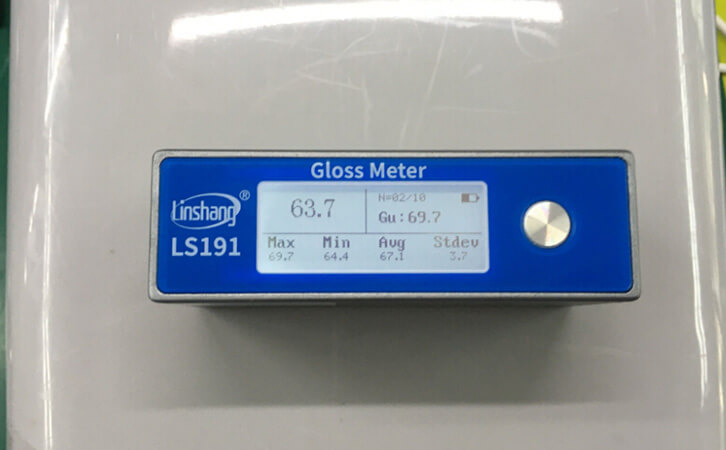What Impact does Plastic Sanding and Polishing have on Gloss?
The surface gloss of plastics will affect the appearance quality of the product. In order to ensure the decorative effect and performance of the product, the gloss after grinding and polishing needs to be evaluated. Next, we will introduce you a method of measuring gloss quality of plastics by a gloss meter for plastic.
1. What impact does plastic sanding and polishing have on gloss?
Gloss is a characteristic of the plastic products surface. Different materials and smoothness of the surface will lead to great differences in the gloss of plastic products. Generally, the higher the density of the material, the better the gloss after polishing. After the plastic parts are ground and polished, the surface gloss of the plastic will disappear or decrease due to the change in the surface smoothness. If you want to accurately evaluate the impact of plastics polishing on gloss, you can use a special gloss meter for plastic to measure.
2. Gloss meter for plastic measures the plastic gloss after grinding and polishing
Gloss meter for plastic is a precision instrument for measuring the specular gloss of the product surface. It consists of structures such as incident light emitters, receivers and standard boards. The measured gloss is based on black glass with a refractive index np = 1.567. When the plane is ideally polished, the plane reflects the natural beam specularly and the gloss value at this time is defined as 100.0 gloss units. Then, under the same conditions, the reflected light flux of the object surface is divided by the reflected light flux of the standard board to obtain the relative value of the object surface glossiness.
Before using the gloss meter for plastic to measure samples of plastic parts, users can use standard boards for calibration. After the instrument is calibrated, the samples before and after the plastic grinding and polishing can be measured respectively. The measured gloss values can be used to evaluate the impact of plastic grinding and polishing on the gloss.
You can take multiple points on the sample surface for measurement. The surface of the sample is required to be clean and tidy. There are no obvious defects of unevenness. When measuring, put the gloss meter on the tested sample surface and fit it tightly. Press the measurement button to record the value of the gloss meter.
3. Gloss detection of plastic parts
The purpose of testing the gloss of plastic is to evaluate the product quality based on data inspection and to indicate whether the production conditions are related to the surface gloss of the material. The refractive index range of plastic is approximately 1.4 ~ 1.6GU and the gloss is generally within the range of 70 ~ 110 GU. You can use the 60 ° gloss meter for plastic LS191 to measure and evaluate the gloss of plastics. We generally use a plastic gloss meter to test the plastic surface gloss to determine the quality of the product.
A gloss meter can be used not only to measure plastic, but also to detect materials such as marble, ink, paint and hardware. For example, Linshang LS192 gloss meter for plastic can be used to measure the gloss of plastic surfaces. The measuring angle of the instrument is 60 degrees and the instrument has the following characteristics:
● Real-time display of measurement data, no button is required for instant measurement.
● The instrument has powerful intelligent statistical functions that can measure standard deviation, maximum, minimum, average and number of measurements.
●The instrument has the function of ambient temperature compensation, allowing long-term calibration and stable measurement values.
●The instrument is equipped with special operation software, which supports USB transmission. The plastic gloss meter can be operated online with the computer and complete the test report.
●The instrument has low energy consumption, small size, good texture and it is easy to carry.
